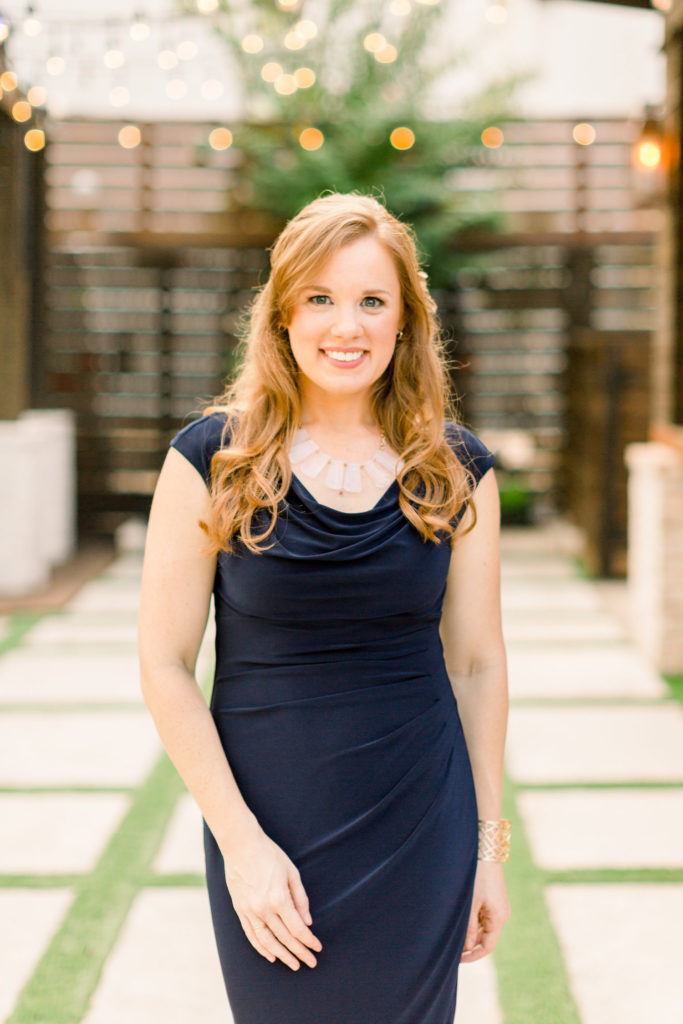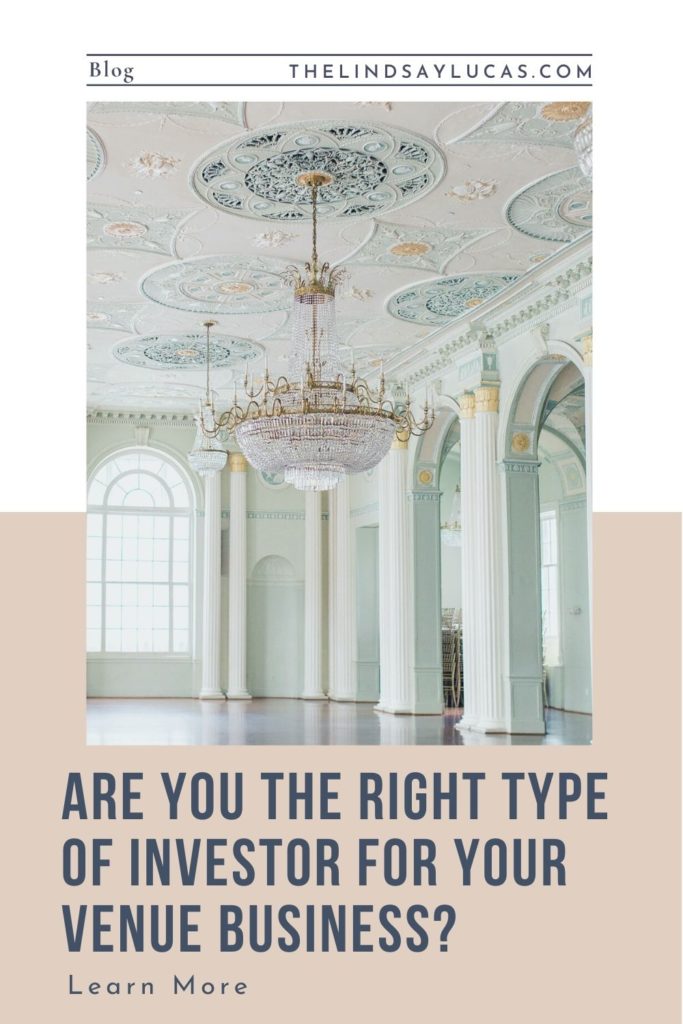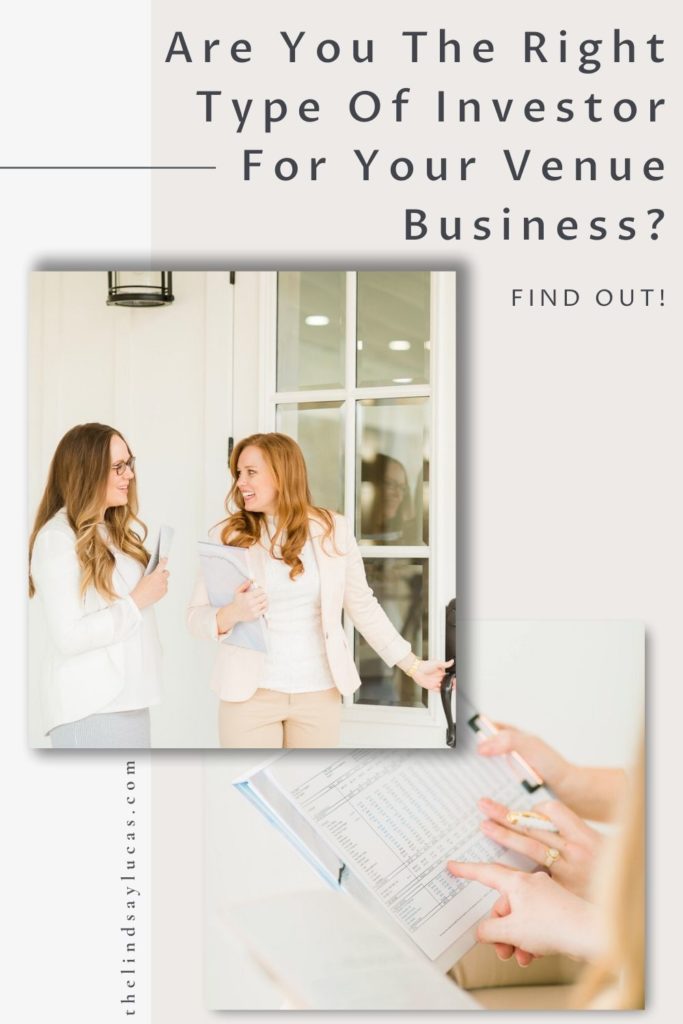Are You the Right Type of Investor for Your Venue Business?
Hey friends! I get a lot of questions when it comes to the topic of venue ownership and being a wedding venue investor. This makes a lot of sense because no one in the industry is talking about wedding venue investors.
What is a wedding venue investor?
When you hear the word “investor,” you’re probably thinking about the many different kinds of investors out there in the business world: private, personal, angel, and venture capitalists. While all of these are specific types of business investors, based on my eight years of experience in the wedding venue industry, there are two different types of wedding venue investors. I’ll dive into both of them, but before I do, I want to talk about something really important when it comes to venue ownership.
If you’re a venue owner, you’re a wedding venue investor
I wish I could look you straight in the eyes and say this: “Every venue owner is a wedding venue investor!” There are so many venue owners who label themselves as “hobbyists” just because they own a family farm they rent out every so often to friends who are getting married (and if that’s you, check out my free guide to prepping your venue). But, regardless of whether or not you actually call your wedding venue a business or just consider it your passion project, you are a wedding venue investor. Why? Because you’re investing your time, resources, space, and property, which immediately makes you an investor in your wedding venue business.
This brings me to my next point. When you’re deciding which type of wedding venue investor you want to be for your business, you need to understand that there is no right or wrong choice. The important thing is, you just have to decide. When considering your wedding venue, ask yourself this question, “What are my endgame and overall goal for my venue?” Let me say this again. There is no right or wrong answer, but beginning with the end in mind is important so that you have a target you’re moving towards, even if the target changes over time.
Two types of wedding venue investors
Alright friends, let’s get into it. There are two different types of venue owners:
1. Legacy Investors
Legacy wedding venue investors are business owners who start their business with the intention of passing it down to children and grandchildren.
2. Business Investors
Business wedding venue investors are business owners starting a venue because they know it’s a great investment. Their intention is to grow the business as much as they can and then sell it when it’s at its peak.
Make your wedding venue an attractive asset
Something I believe fiercely is that whether you are a legacy or business wedding venue investor, you should always, always, always make decisions and build your business with the intention of selling it.
“Wait. Why?” you may ask.
Because even if you’re wanting to pass your venue on to your children, you still want to build it in such a way that it becomes an attractive asset to potential buyers in the future. You might be thinking, “This sounds completely contradictory to a legacy wedding venue investor.” Let me explain.

Regardless of what type of wedding venue investor you choose to be, you can’t possibly know what the future will hold for you and your business. For example, let’s say your spouse gets an incredible job opportunity across the country, and your family has to move. Or perhaps, God forbid, a family member falls ill and can no longer keep the business going, and you’re forced to either let the business die or sell it.
Here’s another scenario to think about. As a parent, my ultimate goal is to raise happy children. If I’m a legacy investor, I’m obviously getting into this and hoping my children will love what I do and eventually inherit the business. But, what if they don’t want to? What if they have their own passions they want to pursue instead of taking over the family business? Or, perhaps the opposite happens—your children are thrilled to take on the business, but three years down the road, the market shifts, and the business doesn’t have as bright of a future as you had once thought. As a wedding venue investor, by setting your wedding venue business up from the start to be an attractive asset for potential buyers, you’re giving yourself more viable options for whatever the future holds.
Make passion-led decisions, not emotion-led decisions
A dear friend of mine, Katie O Selvidge, is a brilliant businesswoman who recently sold two of her businesses. During an Instagram Live, she talked about some of the things she had learned in the process. Katie had a lot of amazing things to say, but there was one statement that had me shouting “amen!” and “preach it sister!” as I sat alone listening in my office. That statement was, “Never make emotionally-led decisions in your business. Instead, make passion-led decisions.” I love that quote so much! Emotions are temporary; they’re fleeting; they don’t stand on solid ground. But passion-led decisions have endurance and bring you back to your “why”.
Set your business up for future success
You might be thinking, “Okay, great Lindsay! But, what are some applicable examples of decisions that will be influenced by the type of wedding venue investor that I decide to be for my venue business?”
So, this is where the topic starts to get a little bit heavier. One of the biggest decisions you will make right off the bat, as a wedding venue investor, is how you decide to set your venue business up, both legally and financially. It’s important to know that there are different types of entities that you can classify your business as that will give you a tax break on the sale of your business in the future.
Let me just say that I am not an expert on this topic. I’m actually in the process of learning as much about this as I can because I’m currently restructuring my own business for this very reason. When I first started off, I originally set up my business as a regular LLC, which is what most entrepreneurs do because it’s the easiest way to go about it when you’re just starting out. However, I had no idea about the longevity of this business. Of course, I had hopes and dreams that it would serve a lot of people like you, but I had no idea what it would eventually grow into. So now I’m backtracking and restructuring to set myself and my business up for success in the future.
Business-owning basics
If you’re just starting your venue journey and this feels like a lot to take in, it’s because it is. You may have even just realized that you are a wedding venue investor. But don’t worry, you’re not alone! Every business owner has been here before. Let me say two things, but before I do, I want to encourage you to check out the Venue Business Plan template that I use to teach my clients in The Venue Academy. Now, here are the two things I wanted to mention:
1. At the very least, get an LLC
Don’t think you have to get into a complicated financial or tax situation based on the future. If you consider yourself a hobbyist, this may not be the most important thing on your docket right now. However, in order to protect your personal assets, you should 100% have an LLC and insurance. There are options to switch from an LLC in the future, so it’s not written in stone, but at least your assets will be protected.

2. Have hard conversations
If you’re a legacy wedding venue investor with family, don’t be afraid to have those hard, deep, and personal conversations. Ask the tough questions to those who might be involved with the property. There’s so much that goes into being a venue owner and partnerships are not easy, but having these tough conversations can set you and your business up for success in the future. Using my Venue Business Audit tool can help you know what to ask and where things may need to shift and change.
Take an action step today
If you don’t know what kind of wedding venue investor you want to be, that’s okay! But don’t stay in that place of not knowing for too long because you don’t want to wake up five years down the road wanting to sell your business only to realize you’re unable to get a tax break on the sale of your property because of how you structured or didn’t structure your business.
Maybe you’re thinking, “Lindsay, I’m a wedding venue investor, but I just have an LLC. But, this sounds really good, and I might be interested in looking at the structure of the backend of my business.” I would challenge you to take an action step and make an appointment with a tax accountant. A tax accountant is different from a CPA because they actually specialize in the structuring of businesses. You might even want to talk to a tax attorney because combined with an accountant, you can really get the answers you’re looking for. Bring a list of questions and get some answers. You will feel so empowered!
If you’re even earlier on in your process and you haven’t invested in a wedding venue quite yet, your next step should be checking out the Profit Planner I’ve designed to help you achieve your dream.
Have an investor mindset
I want to reiterate, whether you consider yourself a hobbyist or not, every venue owner is a wedding venue investor, and you need to have that investor mindset. Whether you consider yourself a legacy wedding venue investor or a business wedding venue investor, it doesn’t matter—as long as you choose one. And finally, set your business up correctly so that you’re maximizing tax breaks. Hire a tax accountant so that you don’t waste precious time and resources in the process.
If you have any questions at all about what I’ve covered in this blog I welcome your questions! Just hit the button below to send me a message!
DID YOU ENJOY THIS BLOG POST? PIN IT FOR LATER…


Affiliate Disclosure
& Content Disclaimer
This post may contain affiliate links from a paid sponsor, Amazon or other program. When you use these links to make a purchase I earn a small commission at no extra cost to you. This allows me to continue creating the content that you love. The content in this article is created for information only and based on my research and/or opinion.
Affiliate Disclosure
& Content Disclaimer
This post may contain affiliate links from a paid sponsor, Amazon or other program. When you use these links to make a purchase I earn a small commission at no extra cost to you. This allows me to continue creating the content that you love. The content in this article is created for information only and based on my research and/or opinion.